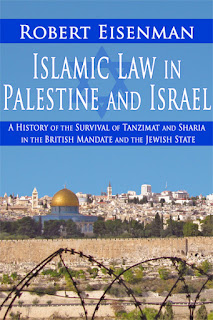 Grave Distractions Publications has re-released Robert Eisenman’s classic work, Islamic Law in Palestine and Israel: A History of the Survival of Tanzimat and Sharia, examines how Islamic law, such as Sharia law, survived in Palestine and Israel in a pure form perhaps longer than in any other Ottoman successor state.
Grave Distractions Publications has re-released Robert Eisenman’s classic work, Islamic Law in Palestine and Israel: A History of the Survival of Tanzimat and Sharia, examines how Islamic law, such as Sharia law, survived in Palestine and Israel in a pure form perhaps longer than in any other Ottoman successor state.It did this for a variety of reasons, chief among which are the innate conservatism of the British and the inability of the Israelis, particularly in the country’s early days, to do much about it. Besides Lebanon and Gaza, only in Israel did those three great monuments of Islamic and Ottoman modernism: the Ottoman Law of Family Rights, the Ottoman Land Code, and the Mecelle-i Akham-i Adliye, survive simultaneously.
Author, Robert Eisenman, traces this continuity from Ottoman times in terms understandable to both specialists, lawyers, and laypersons. The anomaly of Islamic laws', such as Sharia law, survival against the backdrop of British legal concepts and renascent Jewish nationalism is delineated completely. Detailed attention is also given to the effect, or non-effect, of such Israeli reforms in Women’s Equal Rights Law on the Muslim community and on Islamic law, as well as to the creation of Israeli hybrid laws, such as the Land Law of 1969, and a new Israeli modernism.
The situation in Israel today remains more or less the same. In some areas beyond the 1967 Green Lines, where Israeli Law has been applied, it is as described in this book. In others, which have not been annexed or where it has not, Jordanian Law for the most part still obtains.
Islamic Law in Palestine and Israel: A History of the Survival of Tanzimat and Sharia available in both print and eBook editions at various online retailers such as Amazon and Barnes and Noble.

No comments:
Post a Comment